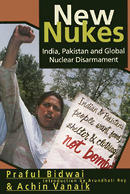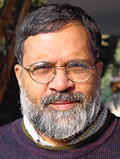September
20, 2002
Portents
From the Kashmir Polls
Now
that the first of four phases of the "litmus-test" elections
to the legislative Assembly of the Jammu and Kashmir (J&K) is
over, India and Pakistan have instantly locked horns over their
representative character and significance. This renewed rivalry
could seriously affect the remaining three phases and the people’s
responses, and in turn further aggravate India-Pakistan tensions.
The voter turnout in the 23 constituencies (of a total of 87) that
went to the polls on Monday is now officially estimated at (a revised)
48 percent. While this is much lower than the average turnout in
India (65 percent or so), it exceeds the earlier official expectations
for Kashmir (40 percent), and is considerably higher than polling
in the last Parliamentary elections, of 1999, (although lower than
in the 1996 Assembly elections).
The Indian government, in particular the hawkish Deputy Prime Minister
LK Advani, boasts that the relatively peaceful first round is a
slap in the face of Pakistan, which "failed" to disrupt
the elections despite its best efforts through "cross-border"
infiltration. The vote is being tom-tommed as a great victory and
a vindication of New Delhi’s "tough" policy of refusing
out talks with Kashmir’s "separatists" and detaining major
leaders like the Jamaat-i-Islami’s Syed Ali Shah Geelani and J&K
Liberation Front’s Yaseen Malik for months.
Arch-conservatives in India hope the elections will obviate the
need for a dialogue with Pakistan on the Kashmir problem.
Pakistan has dismissed the elections as "farce" and "sham".
"The people of Kashmir have rejected those elections,"
foreign ministry spokesman Aziz Ahmed Khan has said. "We know
from experience…what kind of elections they were…"
Islamabad’s line is that the elections are a totally coercive exercise
based on the herding of electors into polling booths by the Indian
security forces; their overwhelming objective is to put the ruling
National Conference, the local ally of the Bharatiya Janata Party,
back into power in Srinagar.
The truth is far more complex than the Indian and Pakistani official
claims – indeed, more so than most international media reports, or
the official comments from Washington, suggest. Like the voter turnout,
the Kashmir picture is like a glass that is half-full or half-empty,
with many "negatives", as well as positives.
On the "positive" side, there was genuine interest among
voters, most remarkably in the contested Kashmir Valley, as the
election campaign got under way in late August. According to many
local observers, the interest level was higher than seen in any
election in 30 years, barring 1987. Candidates were drawing 8,000
to 10,000-strong crowds in campaign meetings.
The "election fever" definitely reflected a change in
the popular mood. It impelled a number of leaders and cadres of
the 23 constituents of the "separatist" All-Party Hurriyat
Conference to consider contesting the elections. For instance, the
People’s Conference led by Sajjad and Bilal, sons of the recently
assassinated major leader Abdul Ghani Lone, put up five "dummy"
or "rebel" candidates – defying the Hurriyat, which opposed
the elections.
The number of candidates filing their nominations rose 30 percent
over 1996. And a host of small parties, focussed upon local issues,
participated, in addition to larger groups like the National Conference,
Congress and the BJP.
The Hurriyat sensed the pro-election mood in early September. It
also came under tremendous pressure from Western diplomats to show
it is serious about "democratic processes" by contesting
the elections. But the mujaheedin groups, to which it is linked,
totally opposed the elections. (Some of these, like many APHC parties
themselves, are backed by Pakistan’s secret agencies.)
At the same time, the Hurriyat was afraid of courting popular disapproval
by openly campaigning against the elections and punishing the PC’s
move to put up "dummy" candidates. Thus, it did not expel
the Lones. After three long meetings, it was forced into an awkward
"compromise" under which the PC only technically suspended
the "rebels".
The Hurriyat has itself been divided between anti-election "hardliners"
and "ambiguists" like the People’s Conference, Jamaat-i-Islami,
and the Awami Action Committee (led by Mirwaiz Umar Farooq). These
are the Hurriyat’s only constituents with a political base and organisational
structure in the Valley.
The situation favouring elections changed somewhat with the killing
of two candidates: an independent on September 6 and law minister
Mushtaq Ahmed Lone last week. After that, a pall of fear and insecurity
descended on the Valley.
Despite that, large numbers of people voted voluntarily, especially
in the rural areas and the overwhelmingly Muslim-majority districts
near the Line of Control with Pakistan, such as Karnah (71 percent
turnout), Gurez (77 percent) and Uri 67 percent).
Another "positive" is that there was little stuffing of
ballot boxes or impersonation (although there were reports of many
people missing from the hurriedly and sloppily revised electoral
rolls, who were prevented from voting).
Not least, there was the "Lyngdoh factor" – the presence
of a highly credible autonomous Election Commission headed by James
Michael Lyngdoh, an officer of exemplary integrity, who had openly
warned the security forces against messing with the elections.
However, the "negatives" were considerable too. The Indian
government’s "tough" policy failed to instill much confidence
among Kashmir’s political leaders. Nor did the state provide enough
security to the campaigning candidates. They became extremely vulnerable
to sniper and bomb attacks. This limited their participation in
the elections.
Another "negative" is the unaddressed popular disillusionment
with and alienation from New Delhi’s policies. Standing for elections
does not presume support for these policies. For instance, many
candidates, including the PC’s "rebels", and others, continue
to swear by "azadi" (autonomy, freedom or independence,
not to be necessarily equated with full secession or statehood,
even less with Kashmir’s merger with Pakistan).
Just prior to the first phase, there was an attempt to force voter
identity cards (not mandatory for elections in India) upon the people,
leading to their harassment and embitterment.
Above all, there was significant coercion by the security forces
to ensure the casting of votes in many polling booths, although
none to vote for a particular party. According to a just-released
report by Coalition of Civil Society, a group of NGOs from the Kashmir
Valley and other parts of India, the coercion was "widespread".
This however is contested by eyewitness accounts, such as those
of Kashmir affairs analyst Sonia Jabbar.
The main coercive agencies were Rashtriya Rifles, an army auxiliary,
and the Border Security Force. Says the CCS: "It is not clear
whether the initiative for coercion came from field commanders at
the local level or whether there was pressure from higher levels
…. Whatever the case, it is reprehensible that coercion occurred
in the face of clear instructions from the Election Commission".
The CCS also speaks of the security forces using loudspeakers in
village mosques to exhort the people to vote. "In some cases
this was accompanied by implicit and explicit threats."
Going by a number of observers’ reports and informal interviews,
the elections were not seen by the Kashmir people as a referendum
on the Indian government’s policies. Behind the change in the popular
mood favouring elections, and the level of participation, is probably
a combination of factors:
The Kashmiris are exhausted with externally-sponsored militant violence,
as well as state repression. September 11’s aftermath and the increasing
illegitimacy of Talibanist Islam have convinced many that there
is no future in jehadi politics. Many believe that a new
J&K government will probably shelter them from growing confrontation
involving India, Pakistan and militant groups.
Local considerations are at work too. Farooq Abdullah’s NC is widely
seen as corrupt, unresponsive to peoples basic needs, and thoroughly
opportunist in allying with the Hindu-sectarian BJP. Many people
probably would vote just to oust it. People’s short-term grievances
about water, roads, hostels and jobs were an important factor at
work.
This is corroborated by the leaked report of one of the 16 Western
diplomats who went to Kashmir as observers: "The real issues
in the elections seem … development and people are concerned about
local issues such as corruption, construction of a road or bridge,
[rather] than independence or going with India or Pakistan."
Many Kashmiris long for a return to less violent life and for ordinary
decencies. Many see the elections as one, probably important, means
to achieve that goal. But their vote is no endorsement of New Delhi’s
policies. An election cannot supplant a comprehensive process to
resolve the Kashmir tangle.
As the CCS puts it, a "variety of motivations and intentions"
lay behind the vote. "A large number of those who voted told
members of [our] team that they did so with absolutely no prejudice
to their respective positions on the way forward to seeking a just
solution to the future of Kashmir".
Islamabad is thus wrong to dismiss the elections. And New Delhi
is equally mistaken to see them as a substitute for a genuine
broad-based dialogue both within India and with Pakistan.
–
Praful Bidwai
Please
Support Antiwar.com
Antiwar.com
520 South Murphy Avenue #202
Sunnyvale, CA 94086
or
Contribute Via our Secure Server Credit Card Donation Form

Your
contributions are tax-deductible
|



